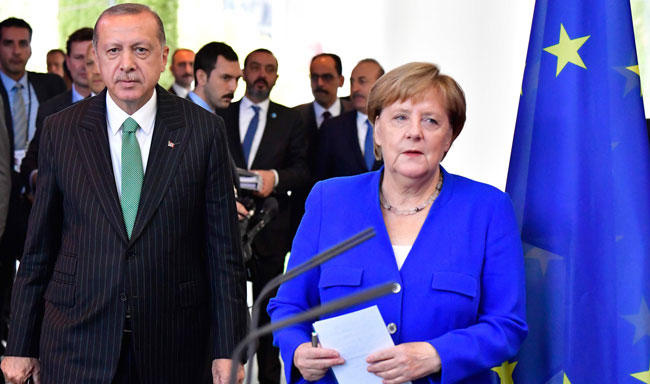Turkish violations should not be ignored in Syria summit: Human rights groups

ERBIL (Kurdistan 24) - EuroMed Rights and Turkey’s Human Rights Association (IHD) called on French President Emmanuel Macron and German Chancellor Angela Merkel to raise with Turkish President Recep Tayyip Erdogan the issue of the ongoing repression of civil society in Turkey during a four-way Syria summit scheduled for Saturday.
“After the attempted coup in 2016 with the imposing of a State of Emergency (SoE), as highlighted by the Council of Europe’s Venice Commission, the Turkish Government “took measures that went beyond what is permitted by the Constitution [of the Republic of Turkey] and by international law,” IHD and EuroMed said in a joint statement released on the day before the summit.
“After the lift of the SoE last July, the exceptional restrictions on basic rights and fundamental freedoms were integrated into ordinary law with the adoption of the controversial law no. 7145,” the statement read. “This law is currently in force and represents a concrete threat to human rights defenders and civil society in the country and establishes a de facto permanent SoE.”
The groups called on France and Germany to “remind President Erdogan that peaceful dissenting voices constitute the very essence of a democracy and must not be criminalised or silenced.”
“Turkish authorities must respect the legitimate demands of the citizens of Turkey to exercise their basic rights and fundamental freedoms, as enshrined in Article 12 of Turkey’s Constitution and international treaties.”
Since the attempted coup, more than 150,000 civil servants, judges, and university teachers have been dismissed from their functions. 7,000 Kurdish citizens have also been arrested and detained, including former pro-Kurdish Peoples' Democratic Party (HDP) Co-chair Selahattin Demirtas, nine lawmakers, and over 60 mayors.
In addition, 94 municipalities formerly run by pro-Kurdish HDP mayors in Kurdish-majority population centers remain under the control of Ankara-appointed bureaucrats and not the elected mayors who the Erdogan administration purged.
In the most recent wave of the ongoing crackdown, Turkey arrested 140 HDP members and local politicians in operations across several provinces in early October.
“Attacks against human rights defenders are widespread,” the statement continued. “Thousands have been sentenced to prison or remain behind bars awaiting trial. Others have been subjected to judicial harassment and some have seen their passports cancelled, banning them from traveling abroad.”
Despite these human rights violations against Kurdish elected politicians, Turkey’s Ambassador to Baghdad Fatih Yıldız, during a forum on Wednesday sponsored by the Erbil-based Middle East Research Institute (MERI), blamed the Kurdistan Workers Party (PKK) for violence against Kurdish and Turkish citizens of Turkey.
“We have a long way to go with those reforms and we set certain benchmarks not only for ourselves, but for others in the region as well,” he said.
“So, Turkey is a friend of the Kurds.”
On Friday, Erdogan issued a “final warning” for U.S.-backed Syrian Kurdish fighters to retreat from sensitive border areas of Syria as he prepared to host world leaders in the search for a negotiated end to the nation’s seven-year conflict.
Editing by John J. Catherine
